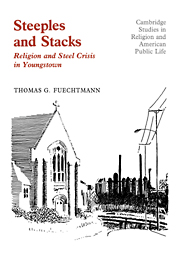Book contents
- Frontmatter
- Contents
- List of Tables and Figures
- Acknowledgments
- Introduction
- I Steeltown
- II The Industry
- III Shutdown
- IV Coping with Crisis: Community Response to the Shutdown
- V Religion and Urban Economic Crisis
- VI Launching a Movement
- VII The Plan
- VIII Negotiations
- IX Ending, Learning, Beginning Anew
- X Epilogue
- Notes
- References
- Index
III - Shutdown
Published online by Cambridge University Press: 29 March 2010
- Frontmatter
- Contents
- List of Tables and Figures
- Acknowledgments
- Introduction
- I Steeltown
- II The Industry
- III Shutdown
- IV Coping with Crisis: Community Response to the Shutdown
- V Religion and Urban Economic Crisis
- VI Launching a Movement
- VII The Plan
- VIII Negotiations
- IX Ending, Learning, Beginning Anew
- X Epilogue
- Notes
- References
- Index
Summary
In late summer 1977, everyone knew that the steel industry in Youngstown was having troubles. Over the past ten years, no less than 6, 600 basic steel jobs in the Mahoning Valley had been phased out, dropping from 32, 000 in 1967 to 25, 400 in 1977. In the first half-year, the largest steel producer in the valley, Sheet and Tube, had posted substantial losses. Concerned about the situation, United Steelworkers district director Frank Leseganich and local president Bill Sferra talked to company officials about the situation, but were assured that Sheet and Tube had no plans to shut down any Youngstown facilities.
At a luncheon meeting of Youngstown's Downtown Kiwanis Club on Friday September 16, William Sullivan, having just returned from Washington, where he testified on economic conditions in the Mahoning Valley, “gave a realistic picture of the industrial outlook here but an encouraging one” (Youngstown Vindicator, September 19, 1977). The Valley had not yet lost a major steel producer. Republic Steel had announced a $160 million capital investment. U.S. Steel had agreed to comply with environmental restrictions on its Youngstown-area plants. Sullivan thought that Sheet and Tube losses in the second half of the year would not be as heavy as they had been in the first half. Meanwhile, down at the open hearth shop in the Campbell Works, some of the old furnaces had been fitted with oxygen lances to improve their efficiency. One of the turns (as shifts are called in the steel industry) had set new tonnage records that week.
- Type
- Chapter
- Information
- Steeples and StacksReligion and Steel Crisis in Youngstown, Ohio, pp. 54 - 69Publisher: Cambridge University PressPrint publication year: 1989

